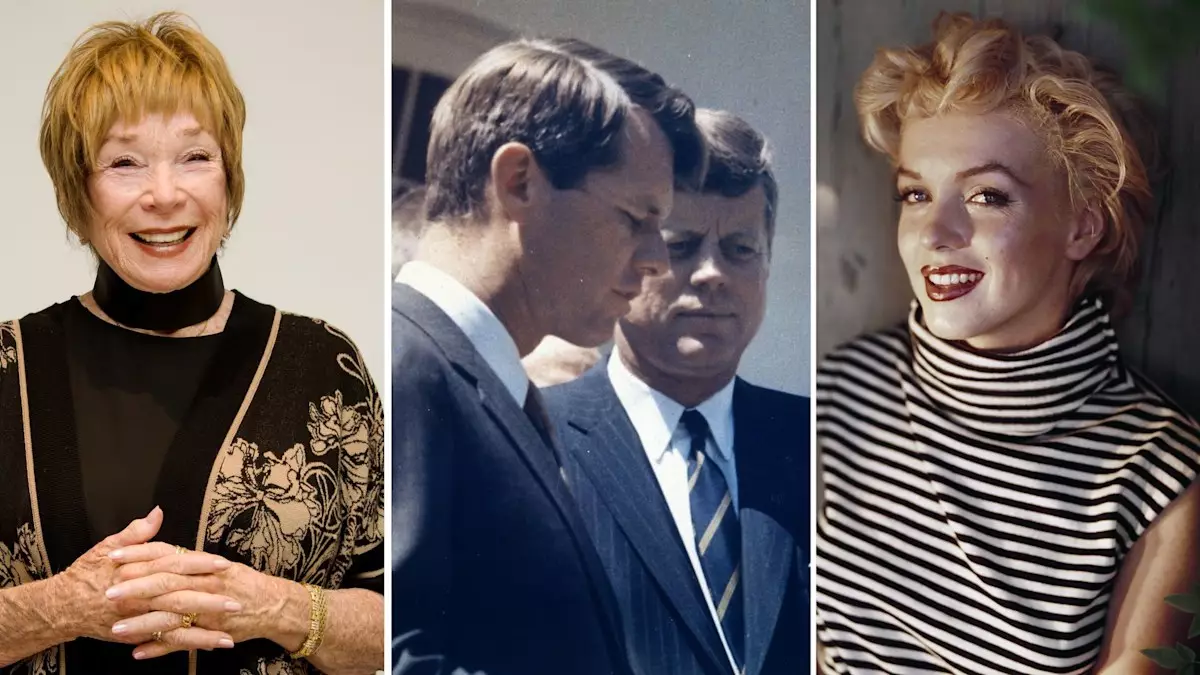The intertwining legacies of Hollywood’s golden age and American political history have often sparked the imagination of the public, but few stories evoke as much fascination as the rumored relationships involving Marilyn Monroe and members of the Kennedy family. At the forefront of this narrative is Shirley MacLaine, an accomplished actress and friend of Monroe, who has recently provided new insights that could potentially reshape the understanding of this infamous triangle. Through her coffee table memoir, *The Wall of Life: Pictures and Stories from this Marvelous Lifetime*, MacLaine has made surprising claims that challenge the established narrative around Monroe’s connections with brothers John and Bobby Kennedy.
According to MacLaine, she personally witnessed a moment that could be described as scandalous—John F. Kennedy exiting a bedroom that Monroe occupied, only for his brother Bobby Kennedy to enter immediately afterward. This detail, shared in her memoir, adds a tantalizing layer of complexity to the long-discussed affair between Monroe and John, which has been well-documented over the years. The atmosphere surrounding the Kennedy family and their relationships with Hollywood figures suggests a world rife with secret encounters and hidden romances, while MacLaine’s assertion serves as a reminder that behind every celebrated public image lies a web of private experiences, often laden with powerful emotions and complex human dynamics.
The Iconic Birthday Tribute
The backdrop to MacLaine’s revelations is the legendary celebration of John F. Kennedy’s 45th birthday at Madison Square Garden in May 1962, a night forever etched in history due to Monroe’s sultry rendition of “Happy Birthday.” Although the performance is frequently recalled as a sparkling moment in entertainment history, MacLaine has drawn attention to the personal consequences that followed. She indicates that this particular event may have catalyzed John’s wife Jacqueline Kennedy to confront her husband, resulting in the end of his affair with Monroe—a devastating conclusion that underscores the emotional toll of such high-profile relationships.
The convergence of personal and political entanglements during this era illustrates how fame can distort perceptions of loyalty and love, ultimately leading to heartache. This pivotal moment not only signaled a shift in Monroe’s life but also marked the beginning of a tragic unraveling, as she would pass away just a few months later, on August 4, 1962.
Hollywood Meets Politics
The connections between Monroe and the Kennedys highlight significant cultural commentary on the intersection of Hollywood glamour and political power. MacLaine plays a crucial role in shedding light on the realities behind the glitz; the shadows cast by ambition and influence are as impactful as the public personas crafted in the spotlight. As she recounts heartfelt stories involving the Kennedy brothers and shares intimate glimpses into her own life, one cannot help but reflect on the broader implications of fame—what it means to love and lose amidst the glaring eyes of history.
MacLaine’s reminiscences offer not only an exploration into the lives of icons but also a deeper understanding of how personal narratives intertwine with historical events. As she reflects on her relationships in Hollywood, including mentioning her surprising “proposition” to fellow actor Morgan Freeman, her anecdotes serve to humanize those often placed on pedestals, reminding readers that even the most celebrated figures grapple with ordinary incidences of love and rejection.
Through *The Wall of Life*, MacLaine constructs a multifaceted portrait of herself and her contemporaries, intertwining personal history with reflections on the American cultural zeitgeist. As someone who navigated both the intricacies of Hollywood and the complexities of personal relationships, her voice contributes to understanding the often hidden aspects of celebrity life.
Ultimately, MacLaine’s memoir is more than just a collection of photographs and stories; it is a testament to a bygone era’s electrifying charm, rife with secrets and scandal. By daring to peel back the layers surrounding Monroe and the Kennedy brothers, she revitalizes a narrative that is as engrossing today as it was half a century ago, leaving readers eager to reconsider the legacies of both entertainment and politics.


Leave a Reply